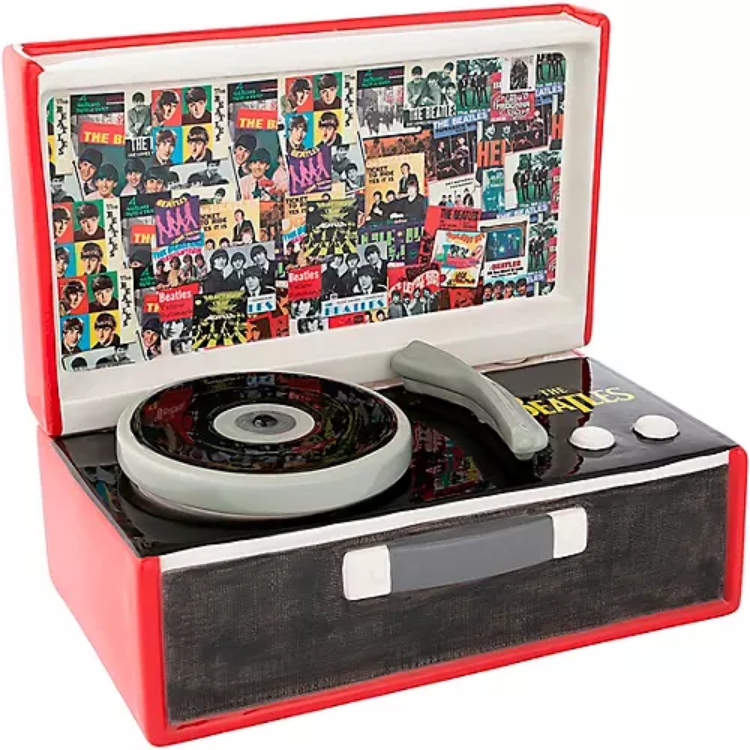- Register
- Log in to Tune-In
- Wishlist (0)
-
Shopping cart
(0)
You have no items in your shopping cart.
Beatles News
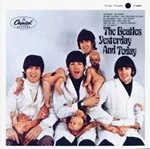
The Beatles had many iconic album covers. From simple shots of the band staring down the lens to more off-kilter, artistic choices, the Beatles’ covers were as diverse as their sound. It’s hard to find fault in any album cover from the Fab Four. Although if we had to, there is one that comes to mind…George Harrison certainly thought so, pointing a finger at one “gross” and “stupid” cover that shouldn’t have made it past the ideation stage.
In 1966, the Beatles released one of their more controversial records: Yesterday and Today. Though the album’s sound was par for the course, the cover turned heads.
The cover featured the band donning butcher coats, surrounded by headless baby dolls. Not the image one typically thinks of when discussing the Beatles. Somehow, the cover got through, although Harrison refused to give it his stamp of approval.
“Gross and Stupid”
Harrison made his feelings on the album quite clear, saying, “I thought it was gross, and I also thought it was stupid.”
“Sometimes we all did stupid things, thinking it was cool or hip when it was naive and dumb, and that was one of them,” he ad details
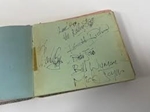
George Harrison’s broken guitar string and a rare set of Beatles autographs obtained by a teenage fan in 1963 could sell for more than $5,352 at auction. The Fab Four scribbled their names down for starstruck 15-year-old Elizabeth Salt and also signed her arm following a gig on April 7, 1963.
Elizabeth, then Elizabeth McBrierty, got to meet her idols following the concert at the Savoy Ballroom in Southsea, Portsmouth. Elizabeth Salt holding her autograph book with The Beatles' signatures and George Harrison's broken guitar string.
An open autograph book with Beatles signatures and George Harrison's broken guitar string taped inside. Now, the autographs and George Harrison’s broken guitar string could sell for more than $5,352 at auction. During the performance, George Harrison snapped his guitar string, and quick-thinking Elizabeth scooped it up from the stage as a souvenir.
Elizabeth said she was “heartbroken” when her dad made her wash off the autographs from her arm – but fortunately still had her autograph book. The album is also stuffed with signatures of other stars, including the Rolling Stones, Cliff Richard, Adam Fait details

As one of the most iconic musical groups of all time, The Beatles have had more than their share of critically well-received album releases.
From early hits like With the Beatles to transformative classics like Sgt. Pepper's Lonely Hearts Club Band, The Beatles are one of the few bands in rock history to have nothing but enjoyable hits making up their larger discography.
As fantastic as many of their musical ventures were over the years, however, there's one classic Beatles album that Paul McCartney remains less than enthusiastic about.
According to Far Out Magazine, McCartney maintains a cool-headed view of the band's 1970 tour de force Let It Be, the twelfth and final Beatles album the group released prior to their breakup in 1970.
While McCartney initially envisioned the project as an epic collaboration between himself, John Lennon, George Harrison and Ringo Starr, studio interference from Phil Spector on the album's direction ultimately led to increasing frustration for McCartney.
As an example, McCartney had hoped to present "The Long and Winding Road" as a straightforward song, using a simple arrangement of piano, bass, guitar and percussion instruments.
When Spector got his details

George Martin became the world’s most legendary producer with the Beatles, the studio wizard who teamed up with four lads from Liverpool to transform music. Now his music has been collected in a lavish new book, George Martin: The Scores, which will be published in April by Curvebender. It’s the first collection of his music manuscripts, opening up his personal archives. The Scores honors the late Sir George Martin on the occasion of his centenary — he was born 100 years ago, on Jan. 3, 1926.
The three-volume book includes dozens of his original handwritten scores for classics like “Strawberry Fields Forever,” “A Day in the Life,” “Here Comes the Sun,” “Yesterday,” “Live and Let Die,” and more. It also has a foreword from one of his biggest fans and closest collaborators: Paul McCartney.
George’s son Giles Martin, an acclaimed producer in his own right, tells Rolling Stone, “It’s a book of art, if you like, because his scores are very beautiful. There’s a fluidity to it. There’s a vibrancy to looking at that music on a page.”
The Scores is a project that began in the producer’ final yea details

Few figures in popular culture carry the kind of gravitational pull John Lennon still commands. As a member of The Beatles, he helped reshape music in real time, first as part of a sharp-suited pop phenomenon, then as one of the central architects of rock’s psychedelic and political awakening. By the early 1970s, Lennon had lived a life few could comprehend: global adoration, unprecedented wealth, and a creative freedom that bordered on dangerous.
That perspective, hard-earned and deeply personal, is what makes a handwritten letter Lennon wrote in 1971 so striking, and so heartbreaking. The letter was addressed to Steve Tilston, then a 21-year-old folk musician riding modest underground momentum following the release of his debut album An Acoustic Confusion. Tilston had recently appeared in an interview with ZigZag magazine, where he was asked whether sudden wealth and fame would damage his songwriting.
Tilston answered honestly: he thought it would. Lennon disagreed.
According to Tilston, recalling the moment years later, “I thought it was bound to, but obviously John Lennon disagreed, and he wrote to me to point out the error of my ways.” What followed was a thoughtful, cand details

With all the machismo that often surrounds the rock ‘n’ roll world and its inhabitants, it’s no wonder that so many rock bands have become aggressive toward one another at some point in their careers. Even without the massive egos and on-stage pressure, working with someone in close quarters can be difficult. The Eagles, Aerosmith, and, more recently, Jane’s Addiction, are all no exceptions. And neither were The Beatles.
The Beatles’ most ubiquitous conflict is certainly the months-long breakup that bookended their time together as the Fab Four. But they had their fair share of rows while they were cutting their teeth, too. According to John Lennon and George Harrison, the worst of this aggression came out in the hours-long gigs they would play in Hamburg, boosted by dangerous mixes of booze and uppers.
How The Beatles Killed Time During Their Lengthy Nightclub Sets
Even the most seasoned musician is bound to feel at least a little weary after playing at performance-level for four hours straight, and The Beatles were doing it while they were just starting out. With the help of upper pills handed out by the Hamburg nightclub waitstaff, the musicians managed to play their rock mu details

Paul McCartney recalls being "depressed" post-Beatles and recounts the formation of Wings in Paul McCartney: Man on the Run
PEOPLE can exclusively reveal the trailer for the new Prime Video documentary, premiering Feb. 27
Wings enjoyed a string of hits in the '70s, including "Live and Let Die" and "Silly Love Songs"
The Beatles were Paul McCartney’s entire life. When the group parted ways, he thought his pen had run dry for good.
The English singer-songwriter, 83, opens up about his life in the wake of the break-up of the iconic British invasion band (McCartney, John Lennon, George Harrison and Ringo Starr) in the new Prime Video documentary Paul McCartney: Man on the Run.
In the trailer for the Morgan Neville-directed doc — which PEOPLE is exclusively premiering — McCartney reflects on the depression he experienced after the Beatles’ break-up, and recounts how he climbed out of it while steering his career in a new direction with his '70s band Wings.
"I’ve always loved the Beatles, but Wings was the band putting out records when I was young," Neville, who directed the Oscar-winning 2013 documentary 20 Feet from Stardom, tells PEOPLE exclusive details

Why would a band member want to sabotage a song that could potentially become a hit? Well, there are quite a few reasons, some of them nonsensical. Let’s take a look at a few rock songs from the 20th century that ended up becoming hits, but not without some resistance from band members who (allegedly) tried to ruin them from the start.
“Across The Universe” by The Beatles (1969)
This gorgeous song, written by John Lennon, is one of the most memorable tracks in The Beatles’ discography. It inspired a movie musical based on their music, after all. And yet, apparently, Paul McCartney was not a fan. And Lennon accused him of trying to ruin the song during the recording process.
“Paul would […] sort of subconsciously try and destroy a great song,” said Lennon. “Usually we’d spend hours doing little detailed cleaning-ups of Paul’s songs; when it came to mine […] somehow this atmosphere of looseness and casualness and experimentation would creep in. Subconscious sabotage.”
He would also say in his famed 1980 Playboy interview that the “guitars are out of tune” on “Across The Universe” and that “nobody details

Take a look inside George Harrison’s childhood home, as guided tours launch for the first time.
Harrison lived at the three-bedroom house in Speke between 1950 and 1962, moving from Arnold Grove in Wavertree at the age of six. The house became a regular rehearsal spot for The Quarrymen and The Beatles, before the Harrison family eventually moved away and George enjoyed worldwide fame.
The property at 25 Upton Green was purchased by Ken Lambert at auction in 2021, who turned the house into a living museum where Beatles fans can stay overnight.
Guests can book to stay at the historic house through Airbnb, with the listing noting: “Walk and stay in George’s bedroom, where he first heard himself and the band on the radio” and “Sit and strum a guitar in the same room where George, Paul, and John sat and rehearsed during the early years.”
While the property has been available on Airbnb for more than three years, tours officially launch today (January 13), delivered by co-owner Dale Roberts. Available once a month, the tours will offer 1.5 hour guided experience inside the house, with unrestricted photography and the chance to try out the instruments inside.
T details
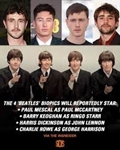
Paul Mescal has said fans “will benefit from knowing as little as possible” about the upcoming Beatles biopics before watching them.
The actor will portray Paul McCartney in Sam Mendes’ four-film series about the Fab Four, which is currently scheduled for a simultaneous release in April 2028. He has said he will be doing his own singing for the role and has spent time with McCartney to prepare.
Speaking to Variety about The Beatles – A Four-Film Cinematic Event, Mescal was hesitant to reveal any details about the new movies. “I don’t want to get into the Beatles thing, not coyly, but actually because I think the world hopefully will benefit from knowing as little as possible going into it,” he explained.
Mescal went on to confirm that production for the forthcoming project was still ongoing. “We’re a while away from finishing,” he told the outlet. “That’s my job for all of 2026.” He also said he and co-stars Harris Dickinson (who is playing John Lennon), Joseph Quinn (George Harrison) and Barry Keoghan (Ringo Starr) were “pinching ourselves” over being involved in the biopics.
“I think the en details

The Beatles Anthology was originally released as a vinyl, CD, DVD box set, and hardbound book volume in 1995. It came 25 years after the band had broken up. And according to the interviews with the group in the new Episode 9, it was better off for it.
Doing it after some time had passed, the band members said, allowed for perspective. They also — and by this time, it was just the three of them after Lennon’s assassination in 1980 — were in a better mood to talk to each other.
The acrimony surrounding the band’s breakup would have made it difficult to work on such a project — and 30 years on, the public would have more of an appetite for a retrospective.
This new edition of the Anthology has been restored and remastered by the wizardry of Peter Jackson of The Lord of the Rings fame. It was he who created the Get Back movie in 2021 out of the ashes of the previous footage shot for the Let it Be film by another director in 1969. And so 30 years after the first retrospective, we have another one with some more nuance and certainly better picture quality than before. There is also the previously mentioned new episode which is essentially a behind the scenes of the maki details
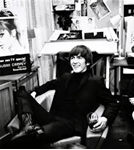
Many called George Harrison the quiet Beatle, but this chaotic TV performance proved he was actually the funniest Beatle! When Harrison was booked for a TV appearance, no doubt the producers were expecting a beautiful spiritual song, or maybe a Beatles classic. But no, he had other plans. Harrison quickly derailed his performance of “My Sweet Lord” by laconically singing “I like to be a pirate, a pirate’s life for me!”, causing chaos in the studio.
The backing band seemed to be thrown for a loop by this, but they managed to keep up while Harrison steamed ahead with his cheeky sea shanty. The presenter objects to the change in material, but Harrison sends him on his way off stage without missing a beat, and then the performance keeps getting weirder from there. The Music Man has to say that this classic performance shows everything we love about the late and dearly missed George Harrison!
Harrison delivered “The Pirate Song,” as he titled it, at the Rutland Weekend Television Christmas special in 1976. Fan channel Kitsu Beatles in recent years uploaded a restored HD version of the performance. Fans loved the skit and added comments such as “Now I understand all the details
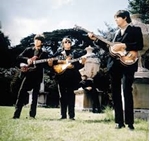
Paul McCartney has always had a passion for live performance. Right from The Beatles’ heady days in Hamburg – when the group would play for eight to 10 hours a day – to his current globe-trotting international runs, the legendary songwriter has relished a connection with audiences. It’s part of what set him apart from the other members of the Fab Four – while John Lennon and George Harrison were keen to get off the road, he always had an itch to get out there and tour.
The legendary figure’s live shows are packed with classic after classic, with the data at Setlist.com making for revealing reading.
Of the 40 most-played songs on Macca’s tours – and around 800 shows have been inputted to the site – the majority are from his Beatles days, testimony to the group’s enduring popularity. The most-represented post-Beatles record is Wings’ all-time classic ‘Band On The Run’, which supplies live highlights such as ‘Jet’.
A closer look at the Top 10 reveals some of the most popular moments of the Paul McCartney live show – ‘Live And Let Die’ and ‘Band On The Run’ are the most-cited Wings tracks, details

The Beatles are back in the spotlight with deluxe releases, viral TikToks and a new wave of young fans discovering the legends. Here’s what you need to know right now.
The Beatles are having yet another moment, and if you thought their story ended in the 60s, you’re missing half the fun. From chart-topping remixes and deluxe reissues to TikTok edits and emotional fan reactions, the most legendary band in pop history is trending with a whole new generation. Whether you grew up with their vinyl, discovered them through your parents, or only know them from that one TikTok sound, this is your quick guide to the latest Breaking News, the must-hear tracks, and how to dive into The Beatles live experience from your screen.
The wild thing about The Beatles right now? Their "new" hits are often songs that are decades old – but getting a second life thanks to remasters, documentaries, and social media. Here are some of the tracks you keep seeing on playlists, charts, and soundtracks:
"Now and Then" – Marketed as the "last Beatles song" and built from a John Lennon demo with help from modern audio technology, this track became a global talking point. The vibe is b details

Most Beatles fans know all about each and every Fab Four album. But what about the non-album singles that often slip through the cracks? Enter “You Know My Name (Look Up The Number)”, one of the most underrated Beatles deep cut tunes out there.
Originally released as the B-side to “Let It Be”, the song itself didn’t make it to the band’s final album in 1970. Rather, it was released as a non-album single. And despite being a bit of an underrated gem, Paul McCartney himself praised John Lennon for writing it. He even said it was his favorite Beatles song.
This comedic music hall song is a unique one for the Fab Four, considering it has some Latin-inspired mambo elements. And the song itself is composed mainly of one line of lyrics; the rest of the song focuses solely on instrumentation. Allegedly, the song title is a reference to one Denis O’Dell, a producer who worked on A Hard Day’s Night with the band back in the day. Apparently, a fan (or several) kept calling him and saying things like, “We know your name and now we’ve got your number.” Fans can be crazy, after all. Especially during the Beatlemania days. Paul McCartney Said It Was & details

